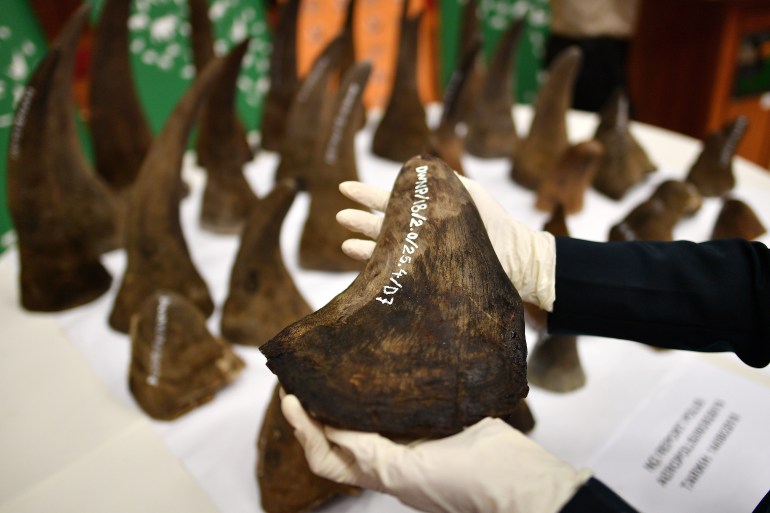Teo Boon Ching, a ‘middleman’ in a global criminal network, was arrested after negotiating a sale of horns to an undercover source.
Ching, 58, was arrested in Thailand on a US extradition request in June 2022, after a covert operation exposed his attempts to traffic at least 219kg (483 pounds) of horns from “numerous” endangered African white and black rhinoceros. He was also sanctioned.
He pleaded guilty and was sentenced on Tuesday in New York.
“Wildlife trafficking is a serious threat to the natural resources and the ecological heritage shared by communities across the globe, enriching poachers responsible for the senseless illegal slaughter of numerous endangered rhinoceros and furthering the market for these illicit products,” Damian Williams, the US Attorney for the Southern District of New York, said in a statement.
“The substantial sentence shows the resolve of this office to use every tool at our disposal to ensure the protection of endangered species.”
The Malaysian is the sixth large-scale wildlife trafficker sentenced in cases recently brought by Williams’s office. The other cases involved the extradition of multiple people from several countries in Africa.
Rhinos are protected under the Convention on International Trade in Endangered Species of Wild Fauna and Flora (CITES) and international trade in their horns is banned.

Rhino horns are considered status symbols and are believed to have medicinal properties in parts of Asia, although there is no evidence of their usefulness.
‘Body blow’
Ching, who also went by the aliases Zhang and Dato Sri, a Malaysian honorific, first came to the attention of law enforcement in 2015 when he was arrested in Thailand with 135kg of elephant ivory.
The Environmental Investigation Agency (EIA), which exposed the trafficking that led to Ching’s latest jail term, said he had probably been involved in the business for at least two decades.
They said he enabled criminal networks to conceal and obscure their illegal shipments of elephant ivory, rhino horns and pangolin scales through Malaysian ports.
EIA said Ching’s imprisonment would remove a key player from the world’s wildlife trafficking business.
“Chinese and Vietnamese organised crime networks have long exploited Malaysia and other Southeast Asian countries as transit hubs for smuggling illegal wildlife commodities from Africa into Asia,” the group’s United Kingdom executive director Mary Rice said in a statement.
“The jailing of Teo Boon Ching and related US Treasury Department sanctions against him and his alleged trafficking organisation constitute a body blow to their ability to function.”
During the sting, Ching met a source on a number of occasions to negotiate the sale of the horns, telling the person he was a “middleman” who acquired rhinoceros horns poached by co-conspirators in Africa and shipped them to customers around the world for a per-kilogramme fee.
He provided them with photos of the horns he could offer.
Law enforcement then arranged for the source to buy 12 horns, which were delivered in a suitcase to Thailand. Analysis by a US Fish and Wildlife Service forensics laboratory concluded that two of the horns were from black rhinos and the remainder from white rhinos.
There are about 27,000 wild rhinos left in the world, mostly in Africa, according to the World Wildlife Fund.
The black rhino is classified as “critically endangered” and the southern white rhino is “near threatened” amid the continued danger of poaching.
